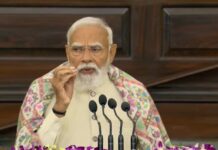New Delhi/Sri Vijaya Puram, July 9: Amid rising concern over workers’ rights, wage stagnation, and aggressive policy reforms, a united platform of central trade unions and sectoral federations has called for a nationwide general strike. The announcement follows a National Convention of Workers held in New Delhi earlier this year, which strongly opposed the implementation of the four labour codes and demanded an overhaul of policies perceived as anti-worker and pro-corporate.
The call to action stems from what unions describe as “deepening inequality” and “erosion of labour rights” under the third-term National Democratic Alliance (NDA) government. Labour bodies like Indian National Trade Union Congress (INTUC), Centre of Indian Trade Unions (CITU), All India Trade Union Congress (AITUC), Hind Mazdoor Sabha (HMS), Self-Employed Women’s Association (SEWA), and others allege that new policies have increased job insecurity, diluted protections, and widened the wealth gap. During the March 18 convention at Pyarelal Bhawan, delegates cited the official economic survey showing falling real wages in the informal sector and marginal job growth, juxtaposed against a 22.3% increase in corporate profits.
Citing the government’s decision to push forward with the implementation of the labour codes, trade unions claim these codes dismantle existing safeguards on minimum wages, work hours, union rights, and collective bargaining. They also criticised the use of laws like the Bharatiya Nyaya Sanhita (BNS) to target dissenting union activity, alleging the criminalisation of peaceful worker protests.
Further grievances include rising fuel prices, price instability, and privatisation of core sectors like banking, insurance, ports, telecom, and energy. The convention reaffirmed demands for a Rs 26,000 minimum wage, rollback of fixed-term employment policies, withdrawal of the Agnipath scheme, restoration of the Old Pension Scheme, and scrapping of the National Monetisation Pipeline (NMP).
Locally, unions in the Andaman and Nicobar Islands have mobilised support through mass awareness campaigns and public meetings. A major mobilisation is planned at Tiranga Park in Sri Vijaya Puram on July 9, 2025, where unions will hold a mass dharna from 2:30 p.m. to 6 p.m. followed by a public meeting until 8 p.m. Demands specific to the islands include regularisation of daily wage workers, implementation of 1/30th pay plus DA for DRMs, and strict enforcement of labour laws.
The protest movement also critiques economic priorities, highlighting the Rs 1.97 lakh crore Production Linked Incentive (PLI) scheme, Rs 2 lakh crore Employment Linked Incentive, and other corporate incentives as ineffective in generating jobs or meaningful investment. In contrast, allocations for MGNREGA, education, and healthcare have reportedly been cut, fuelling discontent.
Union leaders have planned a series of actions leading up to the strike, including gate meetings, district conventions, cycle rallies, and door-to-door campaigns. Notices for the strike are expected to be issued by May 3, with a final push through extensive leaflet distribution and local language outreach.
The trade unions are also pressing for the immediate convening of the Indian Labour Conference and ratification of key International Labour Organization (ILO) Conventions (87, 98, 190), along with legislation to support gig workers, home-based workers, and the informal sector. Calls to strengthen social security, increase pensions, and provide workplace protections in light of climate risks are also part of the campaign.
The May 20 general strike is poised to be one of the most significant demonstrations of organised labour in recent years, testing the strength of worker solidarity across sectors amid a rapidly changing labour landscape.





